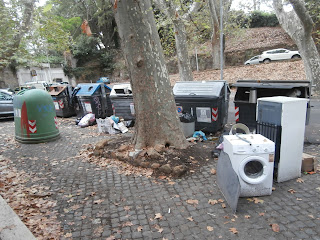Starting out with hints for travellers planning to visit the capital of
Italy:
1. Buy (cheap = WizzAir) airline tickets for weekdays rather than extend the
weekend – we flew there on Sunday and came back on Thursday and the cost was
some 50% in comparison to an extended weekend. Another advantage of such slot is
the lower number of tourists during the working week.
2. Four days are an ideal duration of your stay in Rome, unless you are a
museum freak; this also lets you take hand luggage only and save on baggage charges.
3. Take SitBus shuttle from and to the airport – maybe the fastest, but the
cheapest way to get to the centre of Rome (a return ticket for an adult for
mere 13 Euro).
4. Unless you are a museum freak, do not buy Roma Pass – cost-wise it makes no
sense.
5. Do not even dare to hire a car! Italians drive like lunatics. Plus cost-wise
and convenience-wise it also makes no sense.
6. Buy bus tickets and museum entry tickets online and have QR codes in your
phone to avoid wasting time queuing up.
7. AirBnB offers a wide range of affordable dwellings in cosy neighbourhoods in
which you can feel the climate of Rome.
Before setting off, I weighed up whether to take my nine-year-old Olympus camera, or to just take shots with my smartphone. I compared photo quality from the two devices and eventually picked the camera. However once I get upgraded to a new Samsung S20FE (due to be delivered by a courier by the end of October), the photo quality is likely to be comparable.
First snap, taken from the Palatine hill shows the panorama of a part of Rome and underscores the undulating sites on which the city was built. It does take some fitness to walk uphill and downhill while wandering around the city. As the pic was taken, temperature topped +28C.
The Victor Emmanuel Monument is said to be the blot on the landscape of the capital of Rome as it totally does not fit the surrounding buildings. Note the lack of lanes marked out at Piazza Venezia – here law of the jungle is in force, yet Italian drivers find themselves well in such traffic chaos.
The Roman Forum looks best if you watch it from the distance and slightly from above. The ruins are constantly restored, but one feels the scent of the past at the scene. Note the yawning (or screaming) lad at the right edge!
A typical street in central Rome is narrow, laid with cobblestone, has restaurant gardens over most of the year and… has cars parked on it and brazenly disrupting pedestrian traffic. I have no idea why residents of Rome are so car-ridden. Cars occupy far too much space on the streets, mostly those parked everywhere.
The temple of Pantheon is one of entrance-free tourist attractions, hence a long and winding queue of tourists waiting up to get in. We decided not to queue there, but returned two days later in the evening, when the line turned out to be shorter and the wait lasted mere 20 minutes.
For some fans of classic automobiles, an original Fiat 126 (not confuse for Fiat 126p manufactured in Poland) on old, black number plates, sitting the in the downpour near Borghese gardens.
The Spanish stairs and the entire Piazza de Spagna are less breath-taking than on photos. Also the weather (it just ceased to rain) and the season of the year (in spring the stairs are adorned with flowers) probably have taken some gloss off it.
Di Trevi fountain, though magnificent, is squeezed between other buildings, hence the crampy site also spoils the atmosphere. I advise to pop over here around sunset, when the fountain is lit up. For some an ideal spot to pop the question.
When planning your trip, choose some uncanny places seldom visited by tourist. We ventured to the southern outskirts of Rome to see the remnants of an aqueduct which carried water to Rome two centuries ago.
A Polish accent in the Vatican Museum – the battle of Vienna, painted by Jan Matejko and handed as a gift to a pope in 1860s. The painting commemorates fending off Muslims at the gates of Europe and defending Christianity. Today it brings off ambiguous associations.
St Peter’s square in turn looks smaller than on photographs. To the left – St Peter’s basilique (entrance also for free, queuing lasted around 20 minutes), to the right – a building from which the Pope speaks every Sunday at noon. I had to use to search engine to learn he appears on the second-right window on the top floor.
A typical picture of squalid Rome. Rubbish scattered everywhere spoil the character of the city. One reason for this is the inadequate number of rubbish bins, the other are long-lasting problems with waste collection which plague several Italian cities.
Trastevere, the essential Rome and the most climatic part of the city is a must-see district. Here, a classic view of it – a narrow, cobblestone-laid street, scooters parked, laundry hung out to dry on strings above the street, flowerpots. The place I long to return to!
Unlike in Berlin, Paris or in Warsaw, the river banks are not the a popular hangout nor a nightlife spot. River banks have been laid with concrete, one can see few walkers, runners or cyclists (a bicycle is not a popular vehicle in Rome) there. Maybe the threat of flooding is the answer why the river banks remain undeveloped…















No comments:
Post a Comment